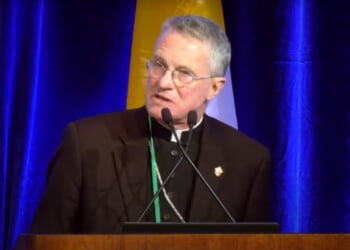CNA Staff, May 22, 2025 /
16:43 pm
Delaware Gov. Matt Meyer this week signed a bill legalizing physician-assisted suicide for terminally ill adults with a prognosis of six months or less to live.
The law, which goes into effect Jan. 1, 2026, allows patients to self-administer lethal medication, making Delaware the 11th state to legalize euthanasia. California, Colorado, Hawaii, Maine, Montana, New Jersey, New Mexico, Oregon, Vermont, and Washington, along with the District of Columbia, also permit the practice.
Meyer said on Tuesday the law is “about compassion, dignity, and respect. It gives people facing unimaginable suffering the ability to choose peace and comfort, surrounded by those they love. After years of debate, I am proud to sign H.B. 140 into law.”
The bill, first introduced in 2015, passed narrowly after a decade-long push by euthanasia advocates, clearing the House (21-16) and Senate (11-8, with two absences) on April 17. Eleven Senate Democrats supported the bill, while a bipartisan group that included three Democrats joined by five Republicans opposed. No Republicans voted in favor of the bill.
Last year, outgoing Democratic Gov. John Carney vetoed the bill when it came before his desk, saying that “although I understand not everyone shares my views, I am fundamentally and morally opposed to state law enabling someone, even under tragic and painful circumstances, to take their own life.”
He went on to cite the official position of the American Medical Association, which says physician-assisted suicide is “fundamentally incompatible with the physician’s role as healer, would be difficult or impossible to control, and would pose serious societal risks. Euthanasia could readily be extended to incompetent patients and other vulnerable populations.”
Wilmington Bishop William Koenig has been urging Delaware residents to oppose the measure, saying in April that “there is a great distinction between, on the one hand, death that comes naturally and, on the other hand, performing actions to bring on death.”
Last year, Koenig, along with Baltimore Archbishop William Lori and Washington, D.C., archbishop Cardinal Wilton Gregory, released a pastoral letter about euthanasia, “A Better Way Forward,” in which they wrote: “The central tenet guiding our opposition to this deadly proposal is that all human life is created in the image and likeness of God and therefore sacred.”
The bishops continued: “We urge all people of goodwill to demand that our lawmakers reject suicide as an end-of-life option and to choose the better, safer path that involves radical solidarity with those facing the end of their earthly journey.”
“Let us choose the path that models true compassion and dignity to those facing end-of-life decisions and protects the most vulnerable from the deadly proposition of physician-assisted suicide,” the letter concluded.
In a message to the International Interfaith Symposium on Palliative Care last year, Pope Francis called euthanasia “a failure of love” and said: “Yet ‘compassion,’ a word that means ‘suffering with,’ does not involve the intentional ending of a life but rather the willingness to share the burdens of those facing the end stages of our earthly pilgrimage.”
Carol Tobias, president of National Right to Life, said in a statement this week: “End-of-life discussions should focus on palliative care, hospice, and support options. Assisted suicide shifts the focus from life-affirming care to premature death and erodes the public trust in health care and medical doctors.”
The National Catholic Bioethics Center (NCBC) has emphasized that “dying patients who request euthanasia should receive loving care, psychological and spiritual support, and appropriate remedies for pain … to live with dignity until the time of natural death.”
The NCBC goes on: “Catholic health care institutions may never condone or participate in euthanasia or assisted suicide in any way,” defining euthanasia as “an act or omission that of itself or by intention causes death to alleviate suffering.”
The Delaware Catholic Advocacy Network, which delivered over 11,000 postcards to legislators, warned of the law’s risks to the elderly, mentally ill, and disabled. Despite the new law, the network is urging Catholics to pray for those who are suffering and to continue to engage their legislators.


















